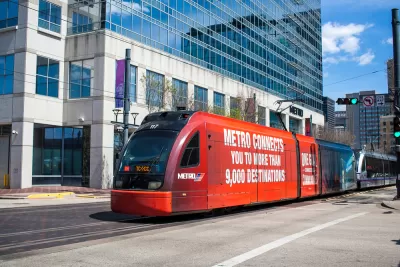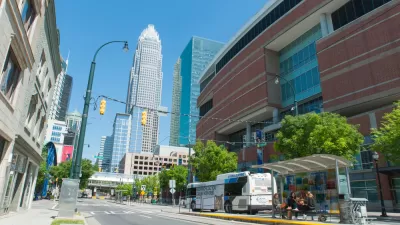The city is investing more in biking, walking, and public transit, but a lack of funding and counterproductive moves from the Texas Department of Transportation are slowing the process of shifting away from personal automobile dependency.

“Although highway expansion continues in the region and driving remains the primary mode of transportation for most Houston-area residents, the city continues to inch away from its reliance on personal cars and trucks while expanding its infrastructure for cyclists, pedestrians and mass transit users,” writes Adam Zuvanich for Houston Public Media.
“The city recently was awarded a $21 million federal grant for a transformative project on a 3-mile stretch of Telephone Road in the southeast part of town, where vehicle lanes will be reduced while bike lanes, wider sidewalks and improved connections with METRO – the region's public transit provider – will be added.” Similar projects are in the works across the city, which has added 400 miles of bike lanes since 2017.
Zuvanich notes that regional governments, such as Harris County and the Houston-Galveston Area Council, have also increased support for multimodality. “The shift is in the interest of increased safety – there were more than 300 traffic-related fatalities and 1,600 serious injuries in 2021, according to Fields – and reducing the region's carbon footprint.” Local boosters say that multimodal transportation options will also help the city stay competitive and spur economic development.
However, Houston still lacks robust investment in non-driving modes. “For example, Houston has a budget of more than $5.7 billion for this fiscal year and the Houston Bike Plan allocates a little more than $1 million annually for bike-related projects,” Zuvanich writes. Meanwhile, the state’s department of transportation continues to push freeway widening and expansion projects, despite local opposition, digging the city into a deeper hole when it comes to car dependency, according to advocates like Harrison Humphreys, the climate programs manager at nonprofit Air Alliance Houston. “We're digging out of it with a spoon, and TxDOT's got an excavator digging the hole deeper.”
FULL STORY: Houston inching away from car-centric reputation with slate of multimodal infrastructure projects

Maui's Vacation Rental Debate Turns Ugly
Verbal attacks, misinformation campaigns and fistfights plague a high-stakes debate to convert thousands of vacation rentals into long-term housing.

Planetizen Federal Action Tracker
A weekly monitor of how Trump’s orders and actions are impacting planners and planning in America.

In Urban Planning, AI Prompting Could be the New Design Thinking
Creativity has long been key to great urban design. What if we see AI as our new creative partner?

King County Supportive Housing Program Offers Hope for Unhoused Residents
The county is taking a ‘Housing First’ approach that prioritizes getting people into housing, then offering wraparound supportive services.

Researchers Use AI to Get Clearer Picture of US Housing
Analysts are using artificial intelligence to supercharge their research by allowing them to comb through data faster. Though these AI tools can be error prone, they save time and housing researchers are optimistic about the future.

Making Shared Micromobility More Inclusive
Cities and shared mobility system operators can do more to include people with disabilities in planning and operations, per a new report.
Urban Design for Planners 1: Software Tools
This six-course series explores essential urban design concepts using open source software and equips planners with the tools they need to participate fully in the urban design process.
Planning for Universal Design
Learn the tools for implementing Universal Design in planning regulations.
planning NEXT
Appalachian Highlands Housing Partners
Mpact (founded as Rail~Volution)
City of Camden Redevelopment Agency
City of Astoria
City of Portland
City of Laramie





























